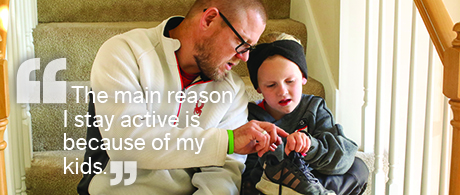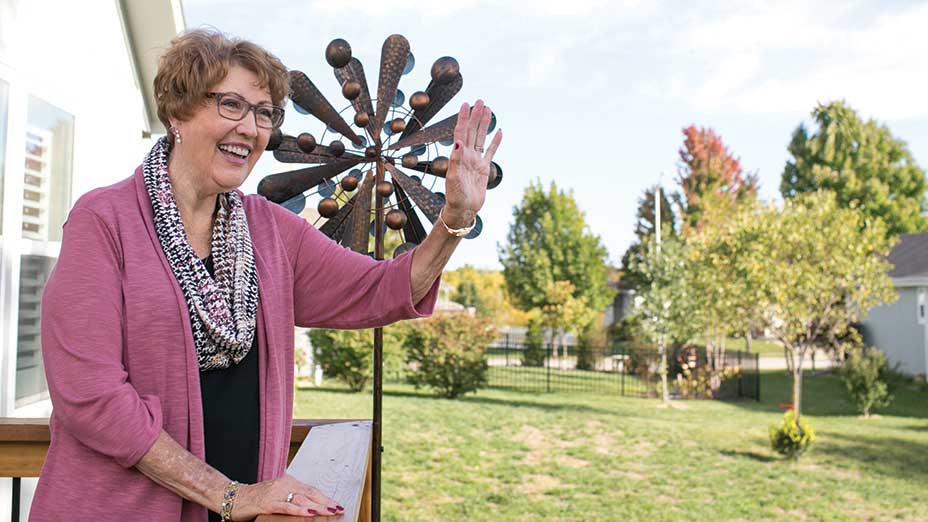In Brandon's Own Words
"I just keep moving until I get my steps in."
Watch Brandon talk about how using a fitness tracker helps his stay active and in control of his kidney failure.
Brandon Smith was alone and far from home when he ended up in a New York City hospital Emergency Room. It was there, while on a work trip, he learned his kidneys were failing. He was 26.
“It was the worst day of my life,” Brandon recalled. “I was at my highest weight and out of shape. I knew I needed to make some changes.” When he returned to Kansas City, Brandon made an appointment with a nephrologist, or kidney doctor, at Nephrology Associates on the NKCH campus.*
Brandon’s doctors told him he would likely need dialysis or a kidney transplant within five years. “They also said that managing my weight, health and food intake could help delay that process,” Brandon said.
Fully Engaged
Fast forward 12 years. With the help of medicine, diet changes and regular physical activity, Brandon has been able to delay a transplant. He attributes part of his success to his use of a fitness tracker, which he started wearing five years ago.
“It’s not good on my body to sit all the time,” Brandon said. “My fitness tracker keeps me accountable for my activity level. When I’m not wearing it, I’m a lot less active.”
Todd J. Beardman, MD, agreed. “If you’re excited about monitoring certain aspects of your health, you’ll be more likely to stick with it,” he said. “This is especially true for people who use devices to track something related to a specific illness.”
Healthy Competition

Brandon tries to log at least 10,000 steps every day. He sets an alarm on his tracker to remind him to get moving every hour. “I don’t like missing my daily goals,” he said. “I just keep moving until I get my steps in.”
To meet his goals, Brandon often engages a few friends in some friendly competition. “We do step competitions to see who can get the most steps in during the work week or over the weekend,” Brandon said. “There have been times when my mom and I have both been up at 11 p.m. with the same number of steps. We’ll just walk around our houses trying to beat each other.”
Data Overload
The amount of data fitness trackers collect is impressive, but it can also be overwhelming. Brandon chose to start small by focusing on counting steps. Over time, he began monitoring his sleep and heart rate.
“When looking at your data, focus on averages over a certain length of time instead of daily activity,” Dr. Beardman suggested. “Averages are easier to understand and can show patterns. They are most helpful to your doctor, too, should you choose to share your data.”
Brandon shares general data from his tracker with his primary care doctor at his annual exams. Now that he’s tracking his sleep, he plans to share his observations at his next nephrology appointment, with the goal of finding some options to improve his sleep health.
Personal Motivation
“The main reason I stay active is because of my kids,” said Brandon, who has two young daughters. “Being diagnosed with such a serious disease at 26 makes me think a lot about death.
"At first, I wanted to survive long enough for my girls to remember me,” he added. “Then, my goal was to see them go to elementary school. Now, I’m looking to the future. I want to see them go to prom, graduate high school, get married and have kids. My fitness tracker helps keep me accountable during the daily grind so I can be around for those big events.”
*NKCH recently earned a High Performing rating in Nephrology from U.S. News & World Report.
Related Articles

March 9, 2020
3 Sneaky IBS Triggers
For people with irritable bowel syndrome, spring may spark a flare-up in symptoms

May 31, 2024
5 Nutrition Tips for a Healthier Lifestyle
Healthy eating and proper nutrition play a big part in maintaining good health. Here's how to improve your nutrition habits.

July 8, 2021
5-ALA Fluorescence Guides Neurosurgeons for More Complete Resections
Neurosurgeons Ammar Hawasli, MD, PhD, and Stephen Reintjes Jr., MD, with Meritas Health Neurosurgery, are now using a progressive treatment that allows for the more precise removal of malignant gliomas and glioblastomas.


